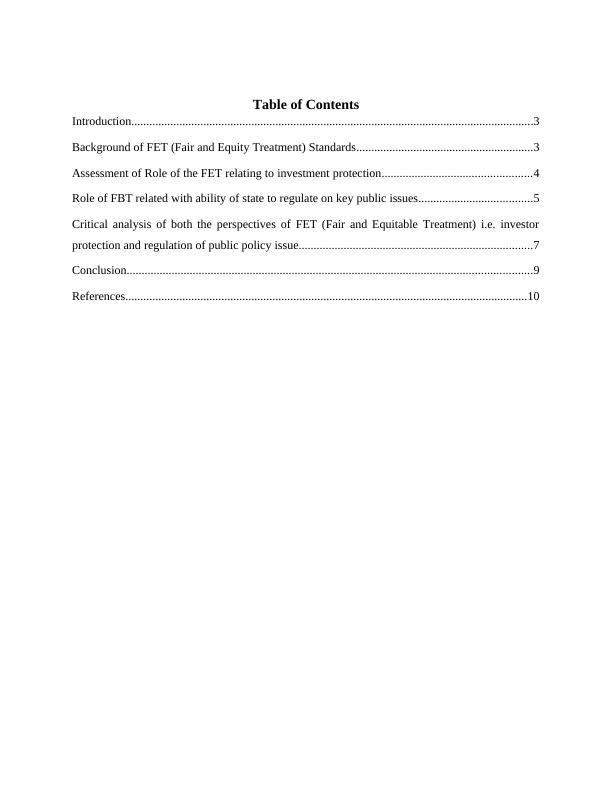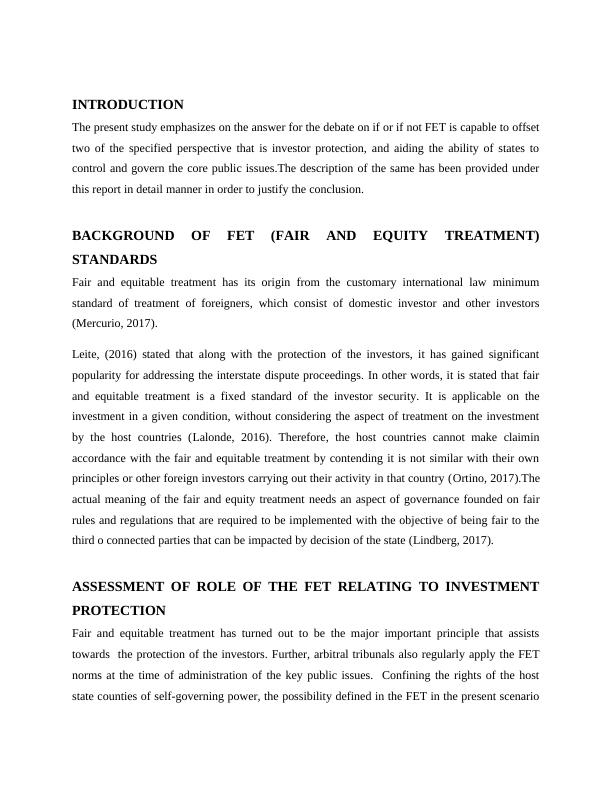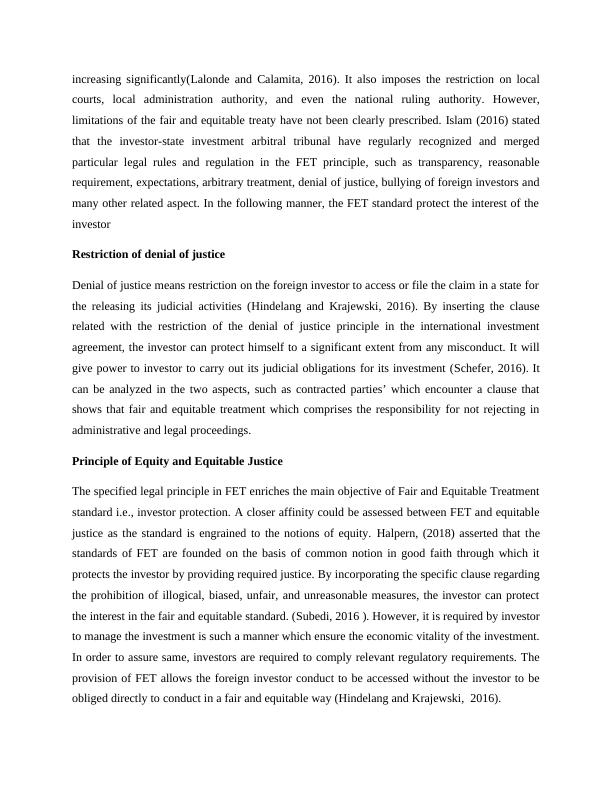Role of Fair and Equitable Treatment in International Business Law
Added on 2023-04-06
11 Pages2545 Words94 Views
International Business Law

Table of Contents
Introduction......................................................................................................................................3
Background of FET (Fair and Equity Treatment) Standards...........................................................3
Assessment of Role of the FET relating to investment protection..................................................4
Role of FBT related with ability of state to regulate on key public issues......................................5
Critical analysis of both the perspectives of FET (Fair and Equitable Treatment) i.e. investor
protection and regulation of public policy issue..............................................................................7
Conclusion.......................................................................................................................................9
References......................................................................................................................................10
Introduction......................................................................................................................................3
Background of FET (Fair and Equity Treatment) Standards...........................................................3
Assessment of Role of the FET relating to investment protection..................................................4
Role of FBT related with ability of state to regulate on key public issues......................................5
Critical analysis of both the perspectives of FET (Fair and Equitable Treatment) i.e. investor
protection and regulation of public policy issue..............................................................................7
Conclusion.......................................................................................................................................9
References......................................................................................................................................10

INTRODUCTION
The present study emphasizes on the answer for the debate on if or if not FET is capable to offset
two of the specified perspective that is investor protection, and aiding the ability of states to
control and govern the core public issues.The description of the same has been provided under
this report in detail manner in order to justify the conclusion.
BACKGROUND OF FET (FAIR AND EQUITY TREATMENT)
STANDARDS
Fair and equitable treatment has its origin from the customary international law minimum
standard of treatment of foreigners, which consist of domestic investor and other investors
(Mercurio, 2017).
Leite, (2016) stated that along with the protection of the investors, it has gained significant
popularity for addressing the interstate dispute proceedings. In other words, it is stated that fair
and equitable treatment is a fixed standard of the investor security. It is applicable on the
investment in a given condition, without considering the aspect of treatment on the investment
by the host countries (Lalonde, 2016). Therefore, the host countries cannot make claimin
accordance with the fair and equitable treatment by contending it is not similar with their own
principles or other foreign investors carrying out their activity in that country (Ortino, 2017).The
actual meaning of the fair and equity treatment needs an aspect of governance founded on fair
rules and regulations that are required to be implemented with the objective of being fair to the
third o connected parties that can be impacted by decision of the state (Lindberg, 2017).
ASSESSMENT OF ROLE OF THE FET RELATING TO INVESTMENT
PROTECTION
Fair and equitable treatment has turned out to be the major important principle that assists
towards the protection of the investors. Further, arbitral tribunals also regularly apply the FET
norms at the time of administration of the key public issues. Confining the rights of the host
state counties of self-governing power, the possibility defined in the FET in the present scenario
The present study emphasizes on the answer for the debate on if or if not FET is capable to offset
two of the specified perspective that is investor protection, and aiding the ability of states to
control and govern the core public issues.The description of the same has been provided under
this report in detail manner in order to justify the conclusion.
BACKGROUND OF FET (FAIR AND EQUITY TREATMENT)
STANDARDS
Fair and equitable treatment has its origin from the customary international law minimum
standard of treatment of foreigners, which consist of domestic investor and other investors
(Mercurio, 2017).
Leite, (2016) stated that along with the protection of the investors, it has gained significant
popularity for addressing the interstate dispute proceedings. In other words, it is stated that fair
and equitable treatment is a fixed standard of the investor security. It is applicable on the
investment in a given condition, without considering the aspect of treatment on the investment
by the host countries (Lalonde, 2016). Therefore, the host countries cannot make claimin
accordance with the fair and equitable treatment by contending it is not similar with their own
principles or other foreign investors carrying out their activity in that country (Ortino, 2017).The
actual meaning of the fair and equity treatment needs an aspect of governance founded on fair
rules and regulations that are required to be implemented with the objective of being fair to the
third o connected parties that can be impacted by decision of the state (Lindberg, 2017).
ASSESSMENT OF ROLE OF THE FET RELATING TO INVESTMENT
PROTECTION
Fair and equitable treatment has turned out to be the major important principle that assists
towards the protection of the investors. Further, arbitral tribunals also regularly apply the FET
norms at the time of administration of the key public issues. Confining the rights of the host
state counties of self-governing power, the possibility defined in the FET in the present scenario

increasing significantly(Lalonde and Calamita, 2016). It also imposes the restriction on local
courts, local administration authority, and even the national ruling authority. However,
limitations of the fair and equitable treaty have not been clearly prescribed. Islam (2016) stated
that the investor-state investment arbitral tribunal have regularly recognized and merged
particular legal rules and regulation in the FET principle, such as transparency, reasonable
requirement, expectations, arbitrary treatment, denial of justice, bullying of foreign investors and
many other related aspect. In the following manner, the FET standard protect the interest of the
investor
Restriction of denial of justice
Denial of justice means restriction on the foreign investor to access or file the claim in a state for
the releasing its judicial activities (Hindelang and Krajewski, 2016). By inserting the clause
related with the restriction of the denial of justice principle in the international investment
agreement, the investor can protect himself to a significant extent from any misconduct. It will
give power to investor to carry out its judicial obligations for its investment (Schefer, 2016). It
can be analyzed in the two aspects, such as contracted parties’ which encounter a clause that
shows that fair and equitable treatment which comprises the responsibility for not rejecting in
administrative and legal proceedings.
Principle of Equity and Equitable Justice
The specified legal principle in FET enriches the main objective of Fair and Equitable Treatment
standard i.e., investor protection. A closer affinity could be assessed between FET and equitable
justice as the standard is engrained to the notions of equity. Halpern, (2018) asserted that the
standards of FET are founded on the basis of common notion in good faith through which it
protects the investor by providing required justice. By incorporating the specific clause regarding
the prohibition of illogical, biased, unfair, and unreasonable measures, the investor can protect
the interest in the fair and equitable standard. (Subedi, 2016 ). However, it is required by investor
to manage the investment is such a manner which ensure the economic vitality of the investment.
In order to assure same, investors are required to comply relevant regulatory requirements. The
provision of FET allows the foreign investor conduct to be accessed without the investor to be
obliged directly to conduct in a fair and equitable way (Hindelang and Krajewski, 2016).
courts, local administration authority, and even the national ruling authority. However,
limitations of the fair and equitable treaty have not been clearly prescribed. Islam (2016) stated
that the investor-state investment arbitral tribunal have regularly recognized and merged
particular legal rules and regulation in the FET principle, such as transparency, reasonable
requirement, expectations, arbitrary treatment, denial of justice, bullying of foreign investors and
many other related aspect. In the following manner, the FET standard protect the interest of the
investor
Restriction of denial of justice
Denial of justice means restriction on the foreign investor to access or file the claim in a state for
the releasing its judicial activities (Hindelang and Krajewski, 2016). By inserting the clause
related with the restriction of the denial of justice principle in the international investment
agreement, the investor can protect himself to a significant extent from any misconduct. It will
give power to investor to carry out its judicial obligations for its investment (Schefer, 2016). It
can be analyzed in the two aspects, such as contracted parties’ which encounter a clause that
shows that fair and equitable treatment which comprises the responsibility for not rejecting in
administrative and legal proceedings.
Principle of Equity and Equitable Justice
The specified legal principle in FET enriches the main objective of Fair and Equitable Treatment
standard i.e., investor protection. A closer affinity could be assessed between FET and equitable
justice as the standard is engrained to the notions of equity. Halpern, (2018) asserted that the
standards of FET are founded on the basis of common notion in good faith through which it
protects the investor by providing required justice. By incorporating the specific clause regarding
the prohibition of illogical, biased, unfair, and unreasonable measures, the investor can protect
the interest in the fair and equitable standard. (Subedi, 2016 ). However, it is required by investor
to manage the investment is such a manner which ensure the economic vitality of the investment.
In order to assure same, investors are required to comply relevant regulatory requirements. The
provision of FET allows the foreign investor conduct to be accessed without the investor to be
obliged directly to conduct in a fair and equitable way (Hindelang and Krajewski, 2016).

End of preview
Want to access all the pages? Upload your documents or become a member.
Related Documents
Investment Law: Understanding the 'Fair and Equitable Treatment' Standard and Its Interpretationslg...
|9
|1666
|313
International Rule of Law and constitutional justice PDFlg...
|24
|8989
|77
Relationship between State's Right to Regulate, Fair and Equitable Treatment and Expropriation under ECT Treaty Practicelg...
|9
|1628
|66
International Investment Lawlg...
|5
|866
|247
Foreign Direct Investment and Investor-State Dispute Settlementlg...
|5
|1104
|258
Justice, Punishment and Rehabilitation in the UK Criminal Justice Systemlg...
|11
|4103
|349